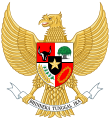This article relies largely or entirely on a single source .(November 2023) |
| This article is part of a series on the |
| Politics of Indonesia |
|---|
 |
Non-ministerial government body (Indonesian: Lembaga Pemerintah Nonkementerian, LPNK), was known as Non-departmental government body (Indonesian: Lembaga Pemerintah Nondepartemen, LPND), is Indonesian state body for specific government task from the President. Chief of LPNK is directly responsible to the President or relevant minister.

















